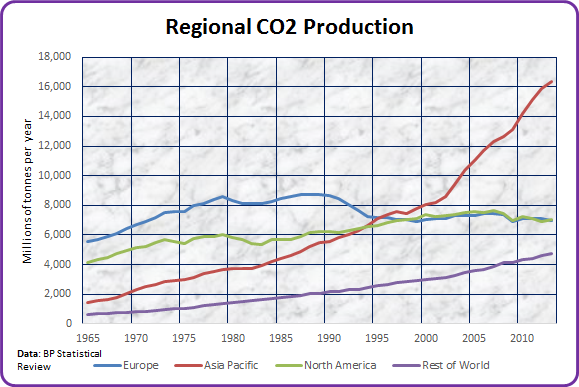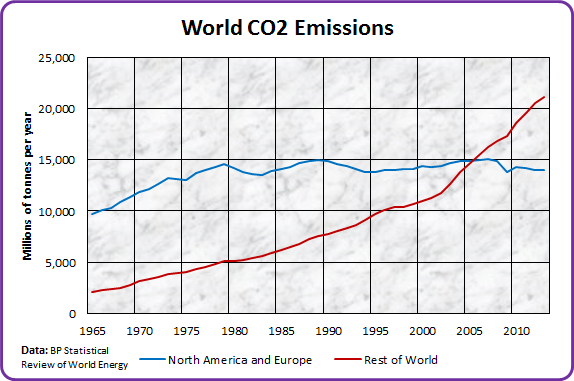Environment & Energy
Related: About this forumGermany’s 2020 greenhouse gas target is no longer feasible
Some of us are slow learners. In 2011, Germany made the decision to shut 8 nuclear reactors and to close three more by 2020. The obvious consequence of this would be that Germany’s greenhouse gas emissions would be higher than they otherwise would have been.
This is simple arithmetic, yet it was denied at the time, and still is, by many (most?) people within the environmental movement. But now many in the environmental movement have suddenly noticed that Germany is not moving away from coal, and this is making their 2020 targets more or less impossible to meet. Naturally, dots remain unconnected, and Germany’s inability to move away from coal is not recognised to be the result of policies lauded by most environmentalists. A new form of denialism.
But how much do Germany’s emissions need to fall? The official target is for greenhouse gas emissions in 2020 to be 40% below 1990 levels. Germany has officially published GHG emissions figures for all years until 2014, and this is what it looks like:

Now. Look closely at the graph above, and you might see a problem. Germany has never reduced its emissions by this much in a 6 year period. In fact, the only time it can remotely close was in the early 1990s, and those cuts were mostly because of the closure of polluting east German industries after the Berlin Wall fell.
What makes it even more difficult is that Germany still has 3.9 GW of nuclear power plants to close before 2020. These power plants have average capacity factors of around 85%, so if we assume their output will be replaced by coal (as it probably will), then this replacement will result in an increase in Germany’s emissions of around 30 million tonnes of CO2 each year.
Too bad, so sad.
Say goodnight, Gracie.
FBaggins
(26,735 posts)Assuming that they aren't interested in reversing their poor nuclear decision... and even with their declining rate of renewables growth... They could meet the 2020 goal by shifting from shutting down natural gas plants while continuing to burn so much coal to shutting down coal plants.
What they can't possibly do is retain that reduction through 2023... because they still have significantly more nuclear capacity left to shut down than they have shuttered so far (almost all of which occurs in 2020-2022).
muriel_volestrangler
(101,311 posts)because the most likely supplier would be Russia.
kristopher
(29,798 posts)...substantial progress to commence again in 2023. They've been concentrating on building renewables (they've installed more than enough to compensate for already closed nuclear) and modernizing their coal fleet into one designed with the flexible capability needed to support rapid increases to high penetration for variable generation.
kristopher
(29,798 posts)Thanks for another post pushing the nuclear industry agenda. We can always count on you for consistency.
For an understanding of the situation in Germany these post (and the blog they come from) are a great resource.
Addressing the same claptrap from the NYT:
The NYT has published another grossly inaccurate article about the European Union, and Germany in particular, in which the author mainly displays her personal agenda. She claims an EU study occasioned her piece, but had she even read it?
http://www.renewablesinternational.net/no-time-for-fact-checking-at-the-new-york-times/150/537/86002/
Apparently she didn't. Craig Morris tracks down some background "data" that the NYT used:
The identity of the European Environment Agency study claiming that Germany and Belgium are the only countries the European Union “not on track to meet their 2020 targets in emissions” has been identified. Only that it does not say any such thing.
On Wednesday, I wrote about a piece in the New York Times referencing a report published on Tuesday. Because the content did not overlap, I surmised that “this report can hardly have occasioned” the article.
Turns out I was right....
http://www.renewablesinternational.net/will-the-real-eea-study-please-stand-up/150/537/86052/
Rebutting a similar article in the Vancouver Sun:
With more than a quarter of the country’s electricity now coming from renewable sources, Germany’s energy transition – or Energiewende – is delivering reliable electricity, reducing emissions, and even decreasing overall costs. To see that, all we need to do is look at the data...
http://www.renewablesinternational.net/germany-proving-skeptics-wrong-on-renewables/150/537/87710/
Here is a bonus.
"Wind power and nuclear electricity production in China, India, Brazil and South Africa up to 2014"
http://cf01.erneuerbareenergien.schluetersche.de/files/smfiledata/4/5/9/4/0/5/105bWindNucBICS2014.pdf
Even with its substantial head start, this data shows that build time for nuclear makes wind the clear choice for rapid carbon reduction.
GliderGuider
(21,088 posts)That's not where the biggest part of the problem is.

GliderGuider
(21,088 posts)Since 1980 the emissions of North America and Europe have remained flat, while those of the rest of the world have quadrupled.
